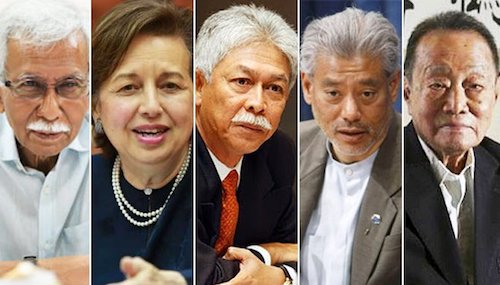CEP proposes changing Malay privileges to reform economy

Long-standing Bumiputra policy favours ethnic majority, from scholarships to contracts must end
Nikkei Asian Review
Prime Minister Mahathir Mohamad’s hand-picked advisers have recommended changes to Malaysia’s Bumiputra policy, a set of affirmative actions aimed to lift the social welfare of the majority-ethnic Malays. The policy, introduced in 1971, accorded a wide range of favoritism — from scholarships to access to government contracts based on ethnicity, rather than on merits.
Past attempts to revise the policy have been met with strong protests from conservatives in the country, including Mahathir, who argued that Malays would be diminished in their own birthplace without state support.
“We want to get it right this time,” Daim Zainuddin, the head of the Council of Eminent Persons, told reporters on Monday. The former finance minister did not reveal the recommendations but said the advisory council would induce “positive mindset change” and competitiveness of the Bumiputra, or sons of the soil.
“Any program proposed and developed should not be to the detriment of economic growth nor at the expense of other social groups,” Daim said.
The suggestions from the advisory council were part of a report, completed on Monday, recommending the government review decadeslong policies seen as promoting abuse of power and hampering progress.
The report, Daim said, was a culmination of 100 days of feedback from over 350 individuals at more than 200 organizations, which included regulatory enforcement agencies, trade associations and social activists.
To grow the economy further, the report proposed a new framework for investment incentives that are “outcome-based” for the promotion of sustainable and inclusive growth, he said.
The country’s fiscal position would be strengthened with a revised tax policy aiming to increase the government coffer in the wake of the abolishment of the goods and services tax, a crucial revenue component.
The recommendations, if adopted by the government, would overturn long-held practices, partly blamed for widespread corruption and abuse of power that hindered progress.
Critics say that the Bumiputra policy, for example, has led to corruption. Beneficiaries who have won government contracts without an open tender sell their stakes for a quick profit. Those who actually take on a contract will become beholden to continuous state support, without which they could not survive in an open market.
Former Prime Minister Najib Razak tried to revise the policy when he came into power in 2009, proposing to liberalize the economy to increase competitiveness. But his proposal was immediately slammed by Mahathir.
Mahathir, now in power for the second time, appears to realize how such discriminatory policy based on one’s ethnicity could hinder the country’s stated goal of becoming a developed economy by 2020.
The prime minister, now on a five-day official visit to China, lamented over the weekend at how Malaysia has fallen behind other countries due to the lack of a “learn and produce” mentality. “In Malaysia, we like to buy and that’s it,” Mahathir said in Beijing on Sunday at a meeting with Malaysian citizens living in China.
But it is not clear how ethnic Malays, who account for about two thirds of the country’s population, would accept any revision to the nearly five-decades-long Bumiputra policy. If implemented without a wide consensus, the revision could push the conservatives to throw their support behind the opposition, led by the United Malays National Organization, the party that Mahathir once belonged to.
UMNO has recently formed a loose alliance with the conservative Malaysian Islamic Party, or PAS. Both parties, which advocate the protection of race and religion as ideology, are seeking to challenge the Mahathir-led Pakatan Harapan, or the Alliance of Hope.
The five-person council, set up immediately after Mahathir came into power after the May 9 election, was tasked to advise the government on institutional reform and resolving the financial scandal in state fund 1Malaysia Development Berhad.
Other members of the council include Zeti Aziz, the former central bank governor of Malaysia; Hong Kong-based tycoon Robert Kuok; Hassan Marican, the former president of Petroliam Nasional, or Petronas; and Jomo Kwame Sundaram, who served for seven years as the United Nations assistant secretary-general for economic development.

